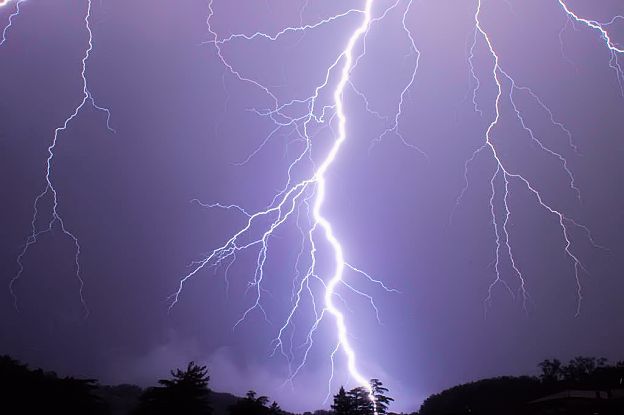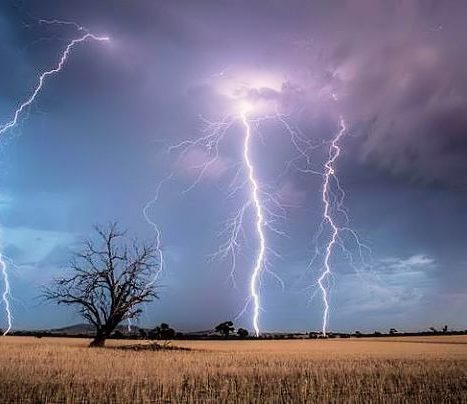
Countable and uncountable nouns, an article explaining the English grammar of this topic with rules and examples plus the case study analysis of the word Thunder.
It is not always obvious whether a word is countable or uncountable. Sometimes words can be countable with one meaning and uncountable with another, e.g. cold and a cold, taste and a taste, country (countryside) and a country. many uncountable nouns become countable when we are talking about kinds or varieties of things. A wine means “a kind of wine”; a sugar means “one of the class of chemicals called sugars”. Strictly speaking, we should talk about countable and uncountable uses of nouns, not about countable and uncountable nouns.
Michael Swan
Countable nouns are the names of separate objects, people, ideas etc which can be counted. We can use numbers and the article a/an with countable nouns; they have plural, a cat, three cats, a newspaper two newspapers.
Uncountable (or ‘mass’) nouns are the names of materials, liquids, abstract qualities, collections and other things which we see as masses without clear boundaries, and not as separate objects. We cannot use numbers with uncountable nouns, and most are singular with no plurals. We do not normally use a/an with uncountable nouns, though there are some exceptions; water (NOT a water, two waters) wool (NOT -a-wool, -two-wools) weather (NOT a weather, two weathers) Some determiners can only be used with countable nouns (e.g. many, few); others can only be used with uncountables (e.g. much, little).
Compare: How many hours do you work? How much money do you earn? Note that not all nouns are either simply countable or simply uncountable. Many nouns have both countable and uncountable uses, sometimes with a difference of meaning. The following rules will help, but to know exactly how a particular noun can be used, it is necessary to check in a good dictionary.

Problem cases. Usually it is easy to see whether a noun is countable or uncountable. Obviously house is normally a countable noun, and sand is not. But sometimes things are not so clear. For instance, travel and journey have very similar meanings, but travel is normally uncountable (it means ‘travelling in general’, and we do not talk about ‘a travel’), while journey is countable (a journey is one movement from one place to another). And many things can be seen both as a collection of separate elements and as a mass; some names for things of this kind are countable, while others are uncountable. Compare: Countable: bean(s), pea(s), grape(s), lentil(s), fact(s) Uncountable: rice, spaghetti, macaroni (and other pasta foods), sugar, salt, wheat, news.
English and other languages. Not all languages treat things in the same way. For example, hair can be uncountable in English, but is plural countable in many languages; grapes is a plural countable word in English, but uncountable in some other languages. Here is a list of some common words which are usually uncountable in English, but which have countable equivalents in some other languages. Corresponding countable expressions are also given.
Uncountable and Countable
accommodation – a place to live (Not an accomodation); advice – a piece of advice (Not an advice); baggage – a piece of baggage a case/trunk/bag; bread – a piece of bread a loaf/a roll; chess – a game of chess; chewing gum – a piece of chewing gum; equipment – a piece of equipment, a tool etc; furniture – a piece/article of furniture; grass – a blade of grass; information – a piece of information; knowledge – a fact; lightning – a flash of lightning; luck – a bit/stroke of luck; luggage – a piece of luggage a case/trunk/bag; money – a note, a coin, a sum; news – a piece of news; permission – —; poetry – a poem; progress – a step forward; publicity – an advertisement; research – a piece of research; rubbish – a piece of rubbish; spaghetti – a piece of spaghetti; thunder – a clap of thunder; traffic – —; travel – a journey/trip;
work – a job; a piece of work.
Note that when uncountable English words are borrowed by other languages, they may change into countable words with different meanings (for example French parking means ‘car park’, not ‘parking’). The names of illnesses are usually uncountable in English, including those ending in -s. If you’ve already had measles, you can’t get it again. There’s a lot of flu around at the moment. The words for some minor ailments are countable: e.g. a cold, a sore throat, a headache. However, toothache, earache, stomach-ache and backache are more often uncountable in British English. In American English, these words are generally countable if they refer to particular attacks of pain. Compare: Love isn’t as bad as toothache. (GB) Love isn’t as bad as a toothache. (US)
Mixed uses. Many nouns have both countable and uncountable uses, with some difference of meaning. Words for materials are uncountable, but we can often use the same word as a countable noun to refer to something made of the material. Compare: – I’d like some typing paper. I’m going out to buy a paper (= a newspaper) – The window’s made of unbreakable glass. Would you like a glass of water? – Have you got any coffee? Could I have two coffees? cups of coffee) And normally uncountable nouns can often be used as countables if we are talking about different kinds of material, liquid etc. Not all washing powders are kind to your hands. The 1961 wines were among the best this century.

Many abstract nouns can have both uncountable and countable uses, corresponding to more ‘general’ and more ‘particular’ meanings. Compare: – Don’t hurry- there’s plenty of time. Have a good time. – She hasn’t got enough experience for the job. I had a really strange experience last week. It’s hard to feel pity for people like that. It’s a pity it’s raining. Singular countable nouns are sometimes used as uncountables (e.g. with much, enough, plenty of or a lot of ), in order to express the idea of amount. I’ve got too much nose and not enough chin. If you buy a Volvo you get plenty of car for your money. We’ve got enough paint for about 20 square feet of wall.
Some countable abstract nouns can be used uncountably after little, much and other determiners. Common examples are difference, point, reason, idea, change, difficulty, chance and question. There isn’t much difference between ‘begin’ and ‘start’. I don’t think there’s much point in arguing about it. We have little reason to expect prices to fall. I haven’t got much idea of her plans. There isn’t any change in his condition. They experienced little difficulty in stealing the painting. Do you think we have much chance of catching the train? There’s some question of our getting a new Managing Director.
A few uncountable nouns have plural uses in fixed expressions. He goes running in all weathers. Did you meet anybody exciting on your travels? Gulliver’s Travels (novel by Jonathan Swift)
a/an with uncountable nouns With certain uncountable nouns – especially nouns referring to human emotions and mental activity – we have to use a/an when we are limiting their meaning in some way. We need a secretary with a first-class knowledge of German. (NOT … with first class knowledge of German.) She has always had a deep distrust of strangers. That child shows a surprising understanding of adult behaviour. My parents wanted me to have a good education. Note that these nouns cannot normally be used in the plural, and that most uncountable nouns cannot be used with al an at all. My father enjoys very good health. (NOT … a very good health.) We’re having terrible weather. (NOT … a terrible weather.) He speaks excellent English. (NOT … an excellent English.) It’s interesting work. (NOT … an interesting work.)
Some uncountable nouns are plural. They have no singular forms with the same meaning, and cannot be used with numbers. Common examples are groceries, arms, remains, goods, customs (at a frontier), clothes, thanks, regards, police. I’ve bought the groceries. (BUT NOT … a grocery. OR … three groceries.) Many thanks for your help. (BUT NOT Much thank …) Other plural uncountables include trousers, jeans, pyjamas, pants, scissors, spectacles, glasses (meaning spectacles), and the expressions the British, the Dutch, the English, the French, the Irish, the Spanish and the Welsh. I need some new jeans. (NOT … -a-newlean,) In 1581 the Dutch declared their independence from Spain.
Countable use Country (countable) = ‘nation’, ‘land’. Scotland is a cold country. France is the country I know best. How many countries are there in Europe? 2 uncountable use Country (uncountable) = ‘open land without many buildings’. I like wild country best. With this meaning, we cannot say a country or countries. My parents live in nice country near Belfast. The expression the country (the opposite of the town) is very common. We live in the country just outside Manchester. Would you rather live in the town or the country?

Thunder noun analysis
The noun thunder can be countable or uncountable. In more general, commonly used, contexts, the plural form will also be thunder. However, in more specific contexts, the plural form can also be thunders e.g. in reference to various types of thunders or a collection of thunders.
The word THUNDER is regarded as uncountable, but there is this title of a book “TWO THUNDERS” and there’s also a film called ‘Seven Thunders’. Call it poet licence because thunder as a noun is uncountable. Does that mean that THUNDER can also be countable?
To make it plural, what you can generally hear the most is “thunderstorm” or “thunder claps”, loud peals of thunder (forti tuoni). As with most noncount nouns, thunder can be used as a count noun to mean “type of thunder”, that is “thunderclaps”. Thunder is a phenomenon, like electricity. So is lightning.
As a verb, it would take the ‘s form as ‘thunders”.
to make (a loud sound) or utter (words) in a manner suggesting thunder
(intr; with it as subject) to be the case that thunder is being heard
(intransitive) to move fast and heavily: the bus thundered downhill
(intransitive) to utter vehement threats or denunciation; rail
Definition of thunder
(Entry 1 of 2)
1 : the sound that follows a flash of lightning and is caused by sudden expansion of the air in the path of the electrical discharge, due to the expansion of rapidly heated air.
2: a resounding loud deep noise (thunders of applause)
2 : bang, rumble the thunder of big guns
3 : a loud utterance or threat
Definition of thunder (Entry 2 of 2)
intransitive verb
1a : to produce thunder – usually used impersonally it thundered
b : to give forth a sound that resembles thunder horses thundered down the road
2 : roar, shout
3: make violent threats etc. against;
4: criticize violently
transitive verb
1 : to utter loudly : roar
2: to utter or communicate (approval or disapproval, etc) loudly or impressively
3 : to strike with a sound likened to thunder
4: to speak so as to be heard at a distance
a hotheaded man who was always thundering about the crooks and idiots running the government
Synonyms for thunder
bawl, bay, bellow, call, cry, holler, hollo (or halloo also hallo), roar, shout, sound off, vociferate, yell
Words Related to thunder
crow, whoop, scream, screech, shriek, shrill, squeak, squeal, caterwaul, howl, ululate, wail, yawp (or yaup), yowl, hail, speak out, speak up
Thunder idioms:
steal a person’s thunder: spoil the effect of another’s idea, action, etc. by expressing or doing it first (from the remark of John Dennis, English dramatist (c.1710), when the stage thunder he had intended for his own play was used for another.
to have a face like thunder: this idiom is not saying someone’s face looks like thunder. In fact, we don’t even know what thunder looks like because we can only hear it. To have ‘a face like thunder’ means to look extremely angry. This idiom probably draws inspiration from thunder itself which is often loud, scary and angry sounding.
black as Thunder: (as) black as thunder Full of rage or hostility, likened to the black clouds that accompany thunderstorms. When I looked up, his face was as black as thunder, and I knew that I was in trouble. A speaker who attracts listeners by using an impassioned, often aggressive, delivery. The phrase originated in the Bible.
thunders of applause.
colloq. thunder-box, a primitive lavatory

Synonyms for thunder
rombo: boom, roar, thunderbolt, thunderclap, thundercloud, thundering, bellow, boom, growl, thunderstorm, thunderstruck;
Synonyms: Verb
bellow, boom, growl, roar;
to make a long loud deep noise or cry;
as we got closer, the waterfall thundered louder and louder
Words Related to thunder
thunderous, thunderer, thundery, thunderless, thunder-box colloq. a primitive lavatory, thump, thumpinggrumble, roll, rumble, bang, blare, blast, peal, scream, screech, shriek, squall, bawl, call, cry, holler, hoot, shout, whoop, yell, bell, caterwaul, howl, wail, yowl,
Near Antonyms for thunder
grunt, mouth, mumble, murmur, mutter, whisper, mewl, pule, squeak, whimper
Thunder (n.) Etymological origin
mid-13c., from Old English þunor “thunder, thunderclap; the god Thor,” from Proto-Germanic *thunraz (source also of Old Norse þorr, Old Frisian thuner, Middle Dutch donre, Dutch donder, Old High German donar, German Donner “thunder”), from PIE *(s)tene- “to resound, thunder” (source also of Sanskrit tanayitnuh “thundering,” Persian tundar “thunder,” Latin tonare “to thunder”). Swedish tordön is literally “Thor’s din.” The unetymological -d- also is found in Dutch and Icelandic versions of the word (compare sound (n.1)). Thunder-stick, imagined word used by primitive peoples for “gun,” attested from 1904.
thunder (v.)
13c., from Old English þunrian, thunor with insertion of d. as in gender, jaundice; Dutch donderen, German donnern, Latin Tonitru, same root as Tonare, to sould, Persian Tundur, from the source of thunder (n.). Figurative sense of “to speak loudly, threateningly, or bombastically” is recorded from mid-14c. Related: Thundered; thundering. Compare
Thor
Odin’s eldest son, strongest of the gods though not the wisest, c.1020, from Old Norse Þorr, literally “thunder,” from *þunroz, related to Old English þunor (see thunder (n.)). His weapon was the hammer mjölnir (“crusher”). It is also curious and strange to notice that this word is very similar to that of Thot (also written Toth, Thoth, or Theuth Thoth) that was the name of an ancient Egyptian deity. In art, he was often depicted as a man with the head of an ibis or a baboon, animals sacred to him. His feminine counterpart was Seshat, and his wife was Ma’at. He was the god of the moon, wisdom, writing, hieroglyphs, science, mathematics, geometry, time measurement, magic, art, and judgment. His Greek equivalent is Hermes. Tóth (sometimes Toth) can nowadays mean “Slovak”, since one of the Hungarian names for Slovakia the northern part of Hungary was Tothorszag. The surname Toth is also a less common German surname (Tod), which is a variation of the German word for “death”.
thorium (n.)
rare metallic element, 1832, Modern Latin, named by its discoverer, Swedish chemist Jöns Jakob Berzelius (1779-1848) from thorite (silicate of thorium), the name of a mineral found in Norway from which it was extracted (which Berzelius also had named, as thoria, in 1828), and named in honor of the Scandinavian god Thor. With metallic element ending -ium.
Thursday (n.)
fifth day of the week, Old English þurresdæg, a contraction (perhaps influenced by Old Norse þorsdagr) of þunresdæg, literally “Thor’s day,” from Þunre, genitive of Þunor “Thor” (see thunder (n.)); from Proto-Germanic *thonaras daga (source also of Old Frisian thunresdei, Middle Dutch donresdach, Dutch donderdag, Old High German Donares tag, German Donnerstag, Danish and Swedish Torsdag “Thursday”), a loan-translation of Latin Jovis dies “day of Jupiter.”
Roman Jupiter was identified with the Germanic Thor. The Latin word is the source of Italian giovedi, Old French juesdi, French jeudi, Spanish jueves, and is itself a loan-translation of Greek dios hemera “the day of Zeus.”
Finally I want to point out that there is a Greek word, ‘‘onomatopoieia’ which literally means “name-making.” The term has been, rather unfortunately, appropriated by some linguists to designate the creation of words which are supposed to imitate sounds heard in nature, like “buzz,” “chug,” “clang,” “coo,” “fizz,” “gurgle,” “purr,” “zip” and “zoom,” or the recent and still slangy “yakity-yak” and “blah” for “idle chatter.”
Returning to onomatopoieia used in the sense of an imitative coinage, we find that many words are formed by a process similar to it, which involves the repetition of the original word with a change in the vowel sound or, less often, of the initial consonant. Such are “zigzag,” “tip-top,” “flim-flam,” “ping-pong,” “pell-mell,” “boogie-woogie,” “walkie-talkie,” even “be-bop.”
At other times there is a process of straight repetition, but in these cases the attempt to imitate a natural sound is more noticeable; “murmur,” “cuckoo,” Italian sussurro, Spanish chuchoteo, French frou-frou are cases in point and “tam-tam” in Italian to indicate a repetitive sound, from a Hindi term of onomatopoeic origin. It is also a characteristic African drum, built entirely of wood, with an internal cavity communicating with the outside through a slot, used in central Africa, Indonesia, Oceania and South America. It can also indicate a means of transmitting news, signals and messages at a distance, according to complex linguistic and percussion codes.
Therefore as a conclusion of this word analysis, in my own opinion I think that this term has probably an onomatopoeic origin.
At the following links you can also find a lot of useful and interesting English language material:
Plural forms in English plus analysis
Video links to learn good English
Interactive English exercises and tests
www.daimon.org/education/english/ Lots of links
www.liveworksheets.com All languages
English Phonetic Symbols with reading examples
https://www.pppst.com/ Lots of free Ppt
http://iteslj.org/questions/ Lots of questions
www.goethe-verlag.com Lots of tests
Improving-bad-grades Article
www.perfect-english-grammar.com
https://www.daimon.org/lib/books.htm Lots of free ebooks
https://epdf.pub/en/ Lots of free ebooks
www.english-online.org.uk/exam.htm
http://www.englishmedialab.com
https://www.englishexercises.org
http://www.tuneintoenglish.com Karaoke songs
Read carefully my friends, I have written more than 10,000 original quotes in Italian, they are all available in the Daimon Club website and in my private electronic library I have something as 200,000 English quotes and thousands of books about everything, most of all classic texts on the English Language, its grammar, its vocabulary and on the main classic subjects taught at secondary school, college and university; therefore if you need something just visit The World Of English on Facebook, like the page, write me, and let me know if I may be of assistance. Bye bye and remember, stay safe, be good and if you can’t be good, at least be careful.

